Serving 615 students in grades Prekindergarten-8, Ips/butler Lab At William Bell 60 ranks in the bottom 50% of all schools in Indiana for overall test scores (math proficiency is bottom 50%, and reading proficiency is bottom 50%).
The percentage of students achieving proficiency in math is 33% (which is lower than the Indiana state average of 38%). The percentage of students achieving proficiency in reading/language arts is 41% (which is equal to the Indiana state average of 41%).
The student:teacher ratio of 15:1 is equal to the Indiana state level of 15:1.
Minority enrollment is 62% of the student body (majority Black), which is higher than the Indiana state average of 37% (majority Hispanic and Black).
Quick Stats (2025)
- School Type: Magnet School
- Grades: Prekindergarten-8
- Enrollment: 615 students
- Student:Teacher Ratio: 15:1
- Minority Enrollment: 62%
- Overall Testing Rank: Bottom 50% in IN
- Math Proficiency: 33% (Btm 50%)
- Reading Proficiency: 41% (Btm 50%)
- Science Proficiency: 40-44% (Top 50%)
- Source: National Center for Education Statistics (NCES), IN Dept. of Education
Top Rankings
Ips/butler Lab At William Bell 60 ranks among the top 20% of public schools in Indiana for:
Category
Attribute
Diversity
Student Attention
School Overview
Ips/butler Lab At William Bell 60's student population of 615 students has grown by 8% over five school years.
The teacher population of 40 teachers has grown by 8% over five school years.
School Type
Grades Offered
Grades Prekindergarten-8
Total Students
615 students
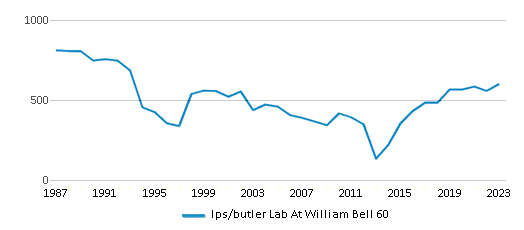
Gender %
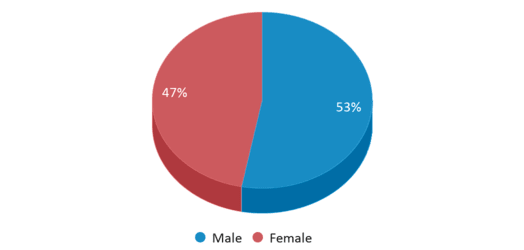
Total Classroom Teachers
40 teachers
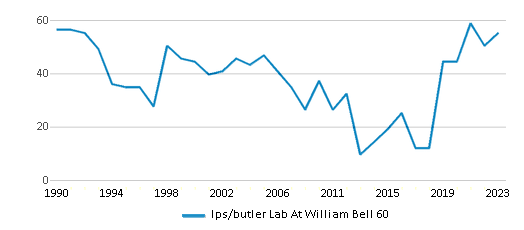
Students by Grade
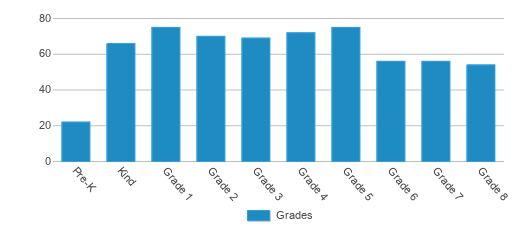
School Rankings
Ips/butler Lab At William Bell 60 ranks within the bottom 50% of all 1,763 schools in Indiana (based off of combined math and reading proficiency testing data).
The diversity score of Ips/butler Lab At William Bell 60 is 0.67, which is more than the diversity score at state average of 0.56. The school's diversity has stayed relatively flat over five school years.
Overall Testing Rank
#981 out of 1763 schools
(Bottom 50%)
(Bottom 50%)
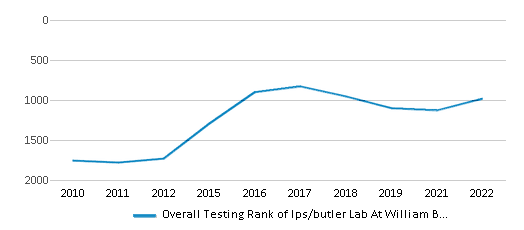
Math Test Scores (% Proficient)
33%
38%
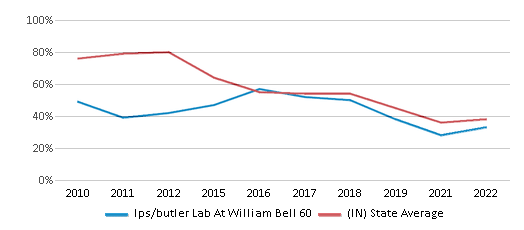
Reading/Language Arts Test Scores (% Proficient)
41%
41%
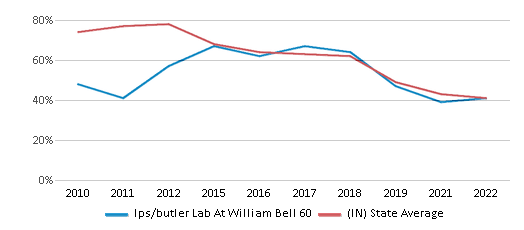
Science Test Scores (% Proficient)
40-44%
34%
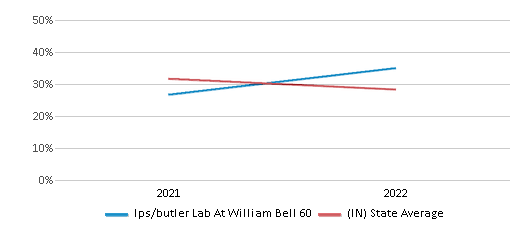
Student : Teacher Ratio
15:1
15:1
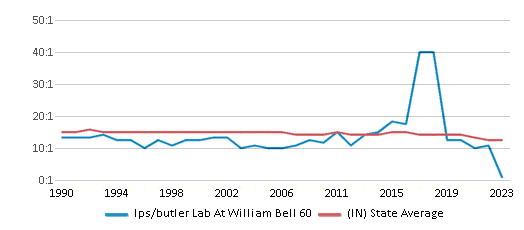
American Indian
1%
n/a
Asian
n/a
3%
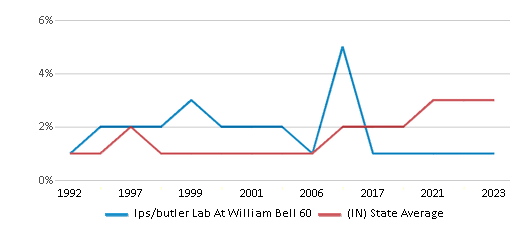
Hispanic
12%
15%
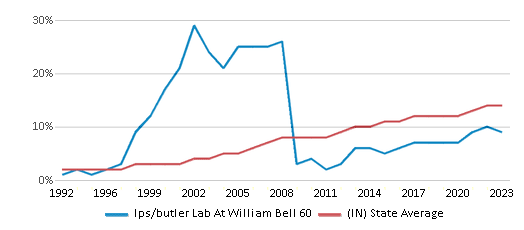
Black
42%
13%
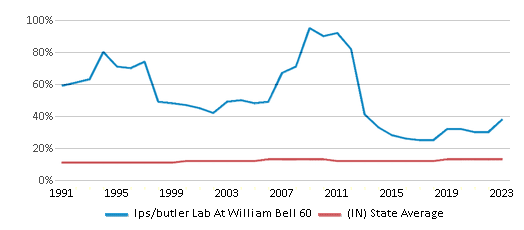
White
38%
63%
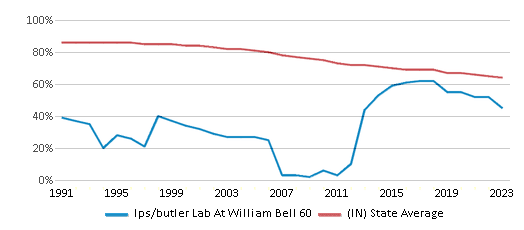
Hawaiian
n/a
n/a
Two or more races
7%
6%
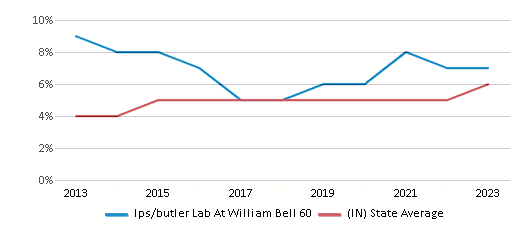
All Ethnic Groups
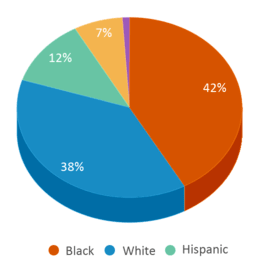
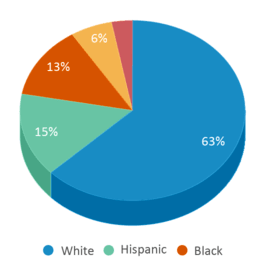
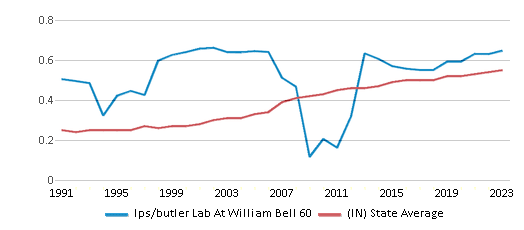
Eligible for Free Lunch
37%
43%
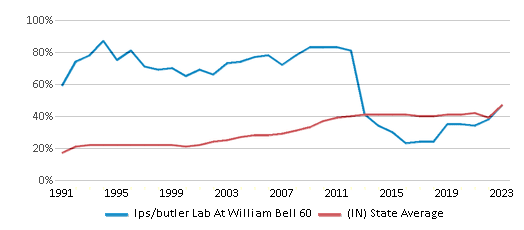
Eligible for Reduced Lunch
2%
6%
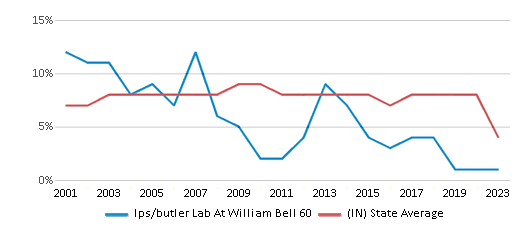
School Statewide Testing
School District Name
Source: National Center for Education Statistics (NCES), IN Dept. of Education
Profile last updated: 02/09/2025
Frequently Asked Questions
What is Ips/butler Lab At William Bell 60's ranking?
Ips/butler Lab At William Bell 60 is ranked #981 out of 1,763 schools, which ranks it among the bottom 50% of public schools in Indiana.
What schools are Ips/butler Lab At William Bell 60 often compared to?
Ips/butler Lab At William Bell 60is often viewed alongside schools like Center For Inquiry School 2, George Washington Carver School 87 by visitors of our site.
What percent of students have achieved state testing proficiency in math and reading?
33% of students have achieved math proficiency (compared to the 38% IN state average), while 41% of students have achieved reading proficiency (compared to the 41% IN state average).
How many students attend Ips/butler Lab At William Bell 60?
615 students attend Ips/butler Lab At William Bell 60.
What is the racial composition of the student body?
42% of Ips/butler Lab At William Bell 60 students are Black, 38% of students are White, 12% of students are Hispanic, 7% of students are Two or more races, and 1% of students are American Indian.
What is the student:teacher ratio of Ips/butler Lab At William Bell 60?
Ips/butler Lab At William Bell 60 has a student ration of 15:1, which is equal to the Indiana state average of 15:1.
What grades does Ips/butler Lab At William Bell 60 offer ?
Ips/butler Lab At William Bell 60 offers enrollment in grades Prekindergarten-8
What school district is Ips/butler Lab At William Bell 60 part of?
Ips/butler Lab At William Bell 60 is part of Indianapolis School District.
In what neighborhood is Ips/butler Lab At William Bell 60 located?
Ips/butler Lab At William Bell 60 is located in the Mapleton Fall Creek neighborhood of Indianapolis, IN. There are 1 other public schools located in Mapleton Fall Creek.
School Reviews
5 5/9/2017
ips butler lab school is awesome!
2 3/28/2011
This school is horrible. DON'T SEND YOUR CHILD HERE. This is a passage that my 6th grader wrote on one of her assignments..SOS...Mom I don't learn anything at all this school. This school is sad. This class is sad. They always play around. They aren't ready for the 7th grade. I don't want to go to the 7th grade and not know anything. I HATE THIS SCHOOL. I was very saddened to know my child felt this way. In addition the school is not appealing to the eye. The students curse and teachers have no control over their students. My fourth grader was also threatened by another student that they would bring a gun to school and shoot her. Never again will my children attend an IPS school.
Review Ips/butler Lab At William Bell 60. Reviews should be a few sentences in length. Please include any comments on:
- Quality of academic programs, teachers, and facilities
- Availability of music, art, sports and other extracurricular activities
Recent Articles

What Is A Charter School?
Explore the world of charter schools in this comprehensive guide. Learn about their history, how they operate, and the pros and cons of this educational innovation. Discover key facts about charter schools, including admission policies, demographics, and funding, as well as what to look for when considering a charter school for your child.

10 Reasons Why High School Sports Benefit Students
Discover the 10 compelling reasons why high school sports are beneficial for students. This comprehensive article explores how athletics enhance academic performance, foster personal growth, and develop crucial life skills. From improved fitness and time management to leadership development and community representation, learn why participating in high school sports can be a game-changer for students' overall success and well-being.

February 05, 2025
Understanding the U.S. Department of Education: Structure, Impact, and EvolutionWe explore how the Department of Education shapes American education, from its cabinet-level leadership to its impact on millions of students, written for general audiences seeking clarity on this vital institution.





